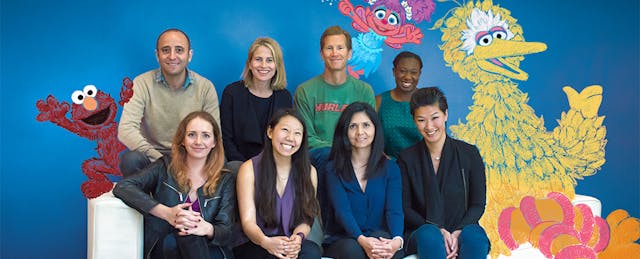Cookie Monster is not the most eloquent character on Sesame Street. But he has one unforgettable line: “A friend is someone to share the last cookie with.” When it comes to finding partners to make investments, Sesame Workshop seems to be heeding these words.
Like the blue furry monster, the nonprofit is hungry—for deals—these days. But even before the Sesame Workshop announced its “Collab+Sesame” Fund in February (welcomed by headlines riffing off its trademark alphabet songs) it was serious about joining the venture capital world. Today, Sesame disclosed it is one of several limited partners in Reach Capital’s $53 million edtech fund, which was first announced last October.
Through this partnership, Sesame aims to support entrepreneurs building tools that serve students in public schools, according to Tanya Haider, Sesame Workshop’s Executive Vice President for Strategy, Research, and Ventures. Speaking with EdSurge, she notes Reach’s “focus on supporting edtech tools that can scale in K-12 schools” and its “research-based approach to make sure companies have impact” as reasons behind her team’s decision to contribute to Reach’s fund. She declined to disclose the amount.
Other limited partners in Reach include The Bill & Melinda Gates Foundation, The Michael & Susan Dell Foundation, Zuckerberg Education Ventures, Scott Cook (co-founder of Intuit) and his wife Signe Cook, and John Doerr (chairman at Kleiner Perkins).
The partnership with Reach complements the Sesame Venture’s $10 million Collab+Sesame Fund, which Haider says will support mostly companies whose tools are sold directly to consumers, or take the “B-to-C” approach. The Collab+Sesame Fund also looks at a broader range of early childhood services that include health, nutrition, childcare and other related needs. So far this fund is considering investments in two education startups.
Haider, along with Reach Capital’s General Manager, Shauntel Poulson, anticipate opportunities where both funds—Reach and Collab+Sesame—will collaborate. “There will be cases where we co-invest with Collab,” Poulson tells EdSurge, given “the overlap in our theses.”
Reach Capital hasn’t looked at many companies serving early-childhood needs; roughly 10 percent of the pitches she gets come from such entrepreneurs, says Poulson. That number is growing, however, and she’s already sharing pitch decks to the Sesame team for their expertise and feedback as part of the due diligence process.
In a blog post announcing this partnership, Jennifer Carolan, Reach’s other co-founder and General Partner, describes the opportunity to leverage Sesame Workshop’s deep roots and research in early childhood education to guide her investments. She pays homage to a 1966 report written by Joan Ganz Cooney, Sesame Street’s founder, as “a blueprint for today’s edtech entrepreneurs.” Carolan writes:
Fifty years later Cooney’s philosophy is still at the core of Sesame Workshop, and it very much echoes the founding philosophy of Reach: supporting companies that use research, differentiation and exploration to scale the educational applications of their technologies to best serve children.
Just as parents and teachers were skeptical of the educational value of television shows in the sixties, similar concerns swirl today about mobile devices. For decades, Sesame has proved it is possible to blend research and educational programming with goofy characters and catchy songs to create a brand that resonates across geography and generations.
But the nonprofit also recognizes it is not well-versed in the ABCs of making bets on companies. The first letter that Sesame Ventures will learn about is K, for Kaymbu, which marks the first early-childhood investment for Reach Capital. The Boston, MA-based startup offers an app that allows teachers to share classroom moments with parents. (The company is wrapping up its fundraising round.)
“Sesame has always been focused on early childhood and intervention,” says Sesame’s Haider, “but as we look at our mission to help kids grow, we want to support them as they get older.”


